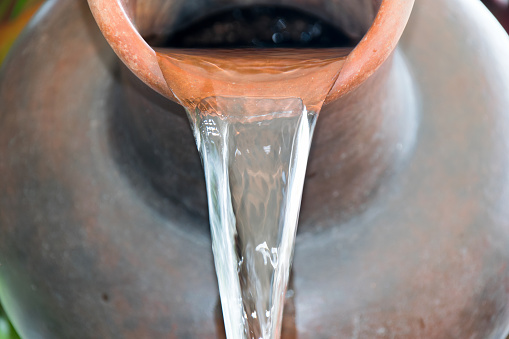
This woman of Sychar clearly wants more than the water she came for. If not more, she could just bring up the bucket, fill her jug, and go back home—before the day gets hotter or somebody else shows up. There and back is her usual routine. She’s not at the well to chat. But she chats with Jesus—actually, matches wits with him, and he seems to relish the back and forth. He’s ready when she carries the conversation forward a bit more, saying “Sir, give me this water.” No doubt, he notes her style—direct and to-the-point: “Give me this water so I won’t be thirsty or have to come here to draw water” (John 4: 15).
She’s responding to what Jesus just said– “Whoever drinks of the water that I will give him will never be thirsty again.” He was more than cryptic: “The water that I will give him will become in him a spring of water welling up to eternal life” (John 4: 14b). It’s a weighty claim, one that surely got her attention.
Read the verse again. Check the details. Jesus speaks of “living water,” but it will permanently prevent thirst, not just answer temporary needs. That’s amazing enough, and he clearly doesn’t mean running water as the woman immediately sees. This water is to be a gift. In a Hebrew linguistic ploy that signals emphasis, Jesus repeats the word give. Indeed, there’s something else odd about this water: It’s active. It “will become [in the one who receives it] a spring of water welling up . . ..” It appears to be some sort of creative agent, self-perpetuating, with the capacity to increase in efficacy and power. This can be no ordinary water. No, it becomes a “spring of water welling up to eternal life.”
Put yourself in this woman’s head. What would you think about all this? I know that’s nearly impossible. The relationship between first century Jews and Samaritans is problem enough, hard to image or get inside of. Then there’s what I suspect was the simple fact of being in the presence of Jesus. People were drawn to him, not just because he healed all the sick or “preached the gospel to the poor,” as he told the disciples of John the Baptist. It’s not a scene we can fully put together, but I’m quite sure that her talk with him was a compelling experience for this woman of Sychar. Even a one-minute conversation with Jesus would be more than memorable.
What did she think he meant when he told her about the water? We don’t know, we just see her interest and that she picks up his offer, as unlikely as it seems. How many offers do we turn down—maybe in the course of a day? This woman has every reason to give the thirsty man that water he wants and leave, telling herself: He isn’t making sense, I’m outta here! So easy to hoist her jug and head back home. But she is interested, too interested to simply write him off and leave. Though he’s saying incomprehensible things, she can’t dismiss the invitation he’s strangely put out there.
You and I have heard that invitation. Ask yourself, as I have, what you’ve done with it. The one who invites has a welcoming aspect. We know what the Bible says about God–that the mercy of God, of God the Son, endures forever! It’s not his desire that anyone should perish. He’s mysteriously one with the Father—the God who didn’t send his Son into the world to condemn the world, as Jesus told the Pharisee. The strangeness of all this just increases my sense of the power of Jesus’ appeal.
What Jesus says next crashes down the whole absorbing encounter. Down comes the fascination, as far down as the heat of the day and the weariness of this dull, routine moment. If the electricity is gone, the shock makes up for it:
“Go, call your husband and come here.”
Nonplussed by another unexpected, outrageous question, maybe she thinks a minute then tells herself, That’s an easy one.
“I have no husband,” she says.
She’s sidestepped with a literalistic hedge. In fact, what she’s told him is true. She isn’t married, she has no husband. But that’s where the plot really begins to thicken. She’s put a spin on it, dodging a demand he knows nothing about. Now she’s safe. Or is she?
from the Edgefield Advertiser, oldest newspaper in South Carolina, November 23, 2021
Thanks to unsplash.com, stockphoto-868503068-170667a.jpg
Recent Comments